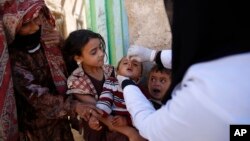Yemen has launched a major polio vaccination campaign amid fears the disease could reappear in the war-ravaged nation where the health system is on the verge of collapse and aid agencies are warning of famine.
The World Health Organization (WHO), which is supporting the drive, said some 40,000 health workers aimed to immunize more than 5 million children under the age of five across the country.
"The threat of [polio] virus importation is serious and this campaign aims to curb any possible return of the virus to Yemen," WHO's representative in Yemen, Nevio Zagaria, said in a statement.
Polio, which spreads quickly among children and can cause irreversible paralysis within hours, remains endemic in only three countries — Afghanistan, Pakistan and Nigeria.
Yemen was declared polio-free in 2009, but experts say conflict-affected countries are particularly at risk of outbreaks because of disruption to their health systems.
WHO's spokesman on polio eradication, Sona Bari, said both Syria and Iraq saw polio outbreaks a few years ago.
"This is why the [Yemen] campaign at this time is extremely important," she told the Thomson Reuters Foundation by phone from Geneva.
"We have been very lucky that polio hasn't shown up in Yemen, but it is a virus that travels very easily and is very good at finding unprotected children."
The immunization drive, which began on Monday, had been scheduled for last September, but insecurity has hampered access.
The vaccination teams will also target high-risk groups including families uprooted from their homes by fighting and refugees who have fled to Yemen from conflicts in Africa.
Around 2 million people are displaced in Yemen where nearly two years of civil war has pitted the Iran-allied Houthi group against a Western-backed Arab coalition led by Saudi Arabia.
The U.N. children's agency UNICEF, which is also helping with the vaccinations, warned on Tuesday of looming famine in Yemen where nearly half a million children have severe acute malnutrition.
Bari said there was a risk that polio vaccines would not be effective in malnourished children suffering from diarrhea because they would be flushed out.
She said WHO was also worried about the risks of polio emerging in countries in the Lake Chad basin, Syria, Iraq, Somalia and South Sudan.





